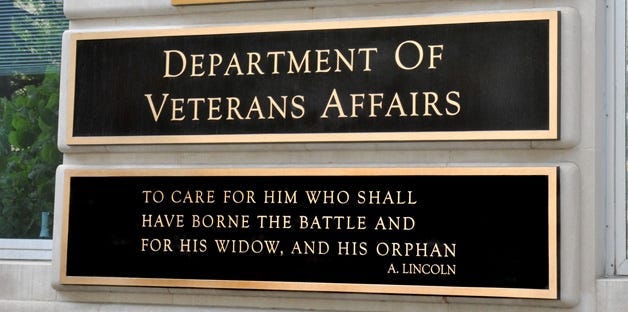
Lawmakers on a key committee advanced 12 bills to the House floor on Thursday, including measures to force the Department of Veterans Affairs to update its motto and legislation aimed at offering protections for victims of VA medical malpractice.
Lawmakers and advocates have called the VA motto, or mission statement, "exclusionary" and "outdated." But VA leaders refused to change it, arguing that it was tantamount to rewriting history.
VA's mission statement quotes Abraham Lincoln's second inaugural address in 1865: "To care for him who shall have borne the battle and for his widow and his orphan."
While the lawmakers said they agreed the "original spirit" of Lincoln's words were inclusive, they argued that it was time to alter the motto slightly to reflect a more diverse veteran population.
More than 10 percent of America's veterans and more than 17 percent of its armed forces are women, reflecting a changing military and VA that necessitates a change to VA's motto to help all veterans feel welcome, lawmakers and advocates said. They suggested an alternative, more inclusive motto that echoes Lincoln's words: "To care for those who shall have borne the battle, and for their families, caregivers and survivors."
Increasingly, changing the motto garnered bipartisan support in Congress. On Thursday, the Honoring All Veterans Act, introduced by Rep. Jackie Speier, D-Calif., passed with unanimous support from Republicans and Democrats on the committee.
“VA’s current gender-exclusive motto doesn’t properly acknowledge (women’s) service, and that is simply wrong,” said Rep. Kathleen Rice, D-N.Y., who has pushed for the change for years. “We’re just as grateful for their service and sacrifice as we are for anyone brave enough to put on our country’s uniform."
Ranking member Phil Roe, R-Tenn., led his fellow Republican lawmakers in support of the change.
"This is easy for me," he said. "All you have to do is change one word.
"I support this bill in recognition of the millions of women who have raised their right hands in service throughout the history of this great country, in gratitude for their bravery."
VA medical malpractice
Lawmakers also advanced legislation Thursday that would provide more protections for veterans who became victims of medical malpractice at VA.
The Brian Tally VA Employment Transparency Act aims to close a more than seven-decade loophole and protect millions of veterans. The bill, introduced by Rep. Mike Levin, D-Calif., would allow any veteran or family member who has filed a claim against VA for damage, injury or death to be entitled to receive, within 30 days, a notice from VA about legal council, the employment status of anyone involved in the claim (including whether they work for VA or are a contractor) and the statute of limitations for the claim.
The bill is named for Marine veteran Brian Tally, who has worked for years since he was irreparably injured by near-fatal Department of Veterans Affairs medical malpractice to ensure what happened to him does not happen to any other veterans.
"Tears are flowing, my heart is racing, I'm shaking and I'm recounting the last 4.5 years," Tally said after the vote Thursday. "Still at a loss of words. We did it."
Another bill in Congress is also named for Tally, but the Employment Transparency Act is the first to pass to the floor for a vote.
Follow Tally’s efforts on Facebook at Rally Around Tally.
Native veterans
The committee passed two measures Thursday aimed at helping Native veterans.
The Native American PACT Act, introduced by Rep. Ruben Gallego, D-Ariz., would prohibit VA from collecting healthcare copayments from veterans who are members of an Indian tribe.
The Department of Veterans Affairs Tribal Advisory Committee Act, introduced by Rep. Debra Haaland, D-N.M., establishes an advisory committee on tribal and Indian affairs to advise VA on issues for Native tribes, tribal organizations and Native veterans.
Lawmakers have increasingly considered legislation to aid Native American and Native Alaskan veterans, who disproportionately do not receive the federal benefits they earned during service.
Native Americans and Native Alaskans are more likely to serve in the U.S. Armed Forces than any other group, yet they remain among the poorest and least insured veterans with the least access to VA services. Native leaders told Connecting Vets that those struggles to get services they earned has increased during the pandemic.
Native veterans are more likely to live far from VA facilities, have lower personal incomes, higher unemployment and are more likely to lack health insurance than other veterans.
–
One Marine is fighting to protect 20 million veterans from medical malpractice
Veterans Affairs leaders refuse to change motto critics call 'exclusionary'
'No one steps up to serve' more than Native Americans, yet they are poorest, least insured vets
Alaska Native veterans cut off from help struggle amid pandemic, chief says
